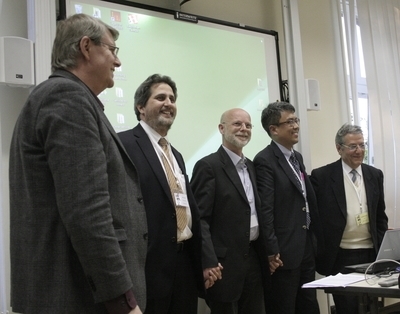
, reporting from Friedensau, Germany
A hundred years after World War I created a split among
German Seventh-day Adventists that remains to this day, the church’s two unions
in Germany have apologized for the combative stance taken by church leaders
during the war and for their treatment of dissidents who left to create the Seventh-day
Adventist Reform Movement.
The apology was read out at a conference in Friedensau,
Germany, that brought together scholars and leaders of the Seventh-day Adventist Church and
the International Missionary Society, one of the two branches of the
Seventh-day Adventist Reform Movement.
The rare meeting signaled a possible step toward mending
relations between the two sides, with International Missionary Society leaders
accepting the apology and saying they would draft a response.
A previous attempt to reconcile both sides 96 years ago at
Friedensau failed.
“The formal apology from the German unions was a model of
how we should behave,” said Daniel Reynaud, associate professor of humanities
and creative arts at Avondale College, Australia, who attended the conference.
“It was very useful to interact with one arm of the Reform Movement, and I wish
that the dialogue continues.”
With the world commemorating the 100th-anniversary of the
start of World War I this year, professors of Friedensau Adventist University decided
to convene the May 12-15 conference to reflect about the influence that 1914-18
war had on Adventists in Germany.

“The experiences of the war resulted in frictions and
disagreements between Adventist brothers and sisters that are still very much
present,” said Rolf Pöhler, conference organizer and director of the
university’s new Institute of Adventist Studies.
“Looking at our history and coming to grips with what
actually happened back then may foster, nevertheless, a better mutual
understanding and enable us to evaluate better more recent developments
regarding the issue of service in the military,” he said.
About 90 participants listened to 20 prominent scholars from
11 countries discuss issues ranging from the origins of the Reform Movement to the
response of Adventists around the world to the challenge of war.
While Britain and Australia allowed for noncombatancy in
World War I, Germany and France provided no exemptions and punished dissidents
severely. But the number of Adventists was small in France and Italy, so only a
few church members were drafted there. In Russia, the authorities treated
church members with deep suspicion because most were of German descent, and
they shipped them off to Siberia.
Adventist leaders in Germany, fearing the possible
persecution and extinction of the church, pledged complete compliance to the military
authorities and asked Adventist conscripts to obey combat orders even on
Sabbath.
In practice, many Adventist conscripts sought medical,
supplies and administrative positions that kept them away from actual combat,
conference presenters said. But the Adventist leaders’ public stance drove a
wedge between church members.
“It was eye-opening to me how quickly human beings adapt to
circumstances and the demands of governments or society, renouncing to stand up
for the values pertaining to the realm of Biblical thought,” said Daniela
Gelbrich, lecturer of Old Testament at Friedensau university. “Life is complex
and we cannot predict how we would decide in a similar context. This is where
humility and grace are needed as well as the unfaltering courage to swim
against the tide of external pressures.”
Johannes Hartlapp, lecturer of church history at the university,
gave a presentation about the origin, faith, and ideology of the Reform
Movement from a Seventh-day Adventist perspective, while Idel Suarez Jr., president
of the General Conference of the International Missionary Society, and Woonsan
Kang, the society’s second secretary, presented the Reform perspective on conscientious
objection.
A few weeks before the conference, the two German unions
issued the apology, and the statement was read at the conference. Suarez said the
society’s executive board needed to meet and draft a response but he was
grateful and happy for the apology. He and Kang joined hands in front of the
audience with lecturer Hartlapp and Holger Teubert, editor of the APD Adventist
news service in Germany, who helped draft the apology.
“The symposium exceeded our expectations by far,” said Pöhler,
the conference organizer. “The joining of hands between the two denominations
was a historic moment.”
A statement of the Seventh-day Adventist Church in Germany regarding the outbreak of World War I
Institute of Adventist Studies: "The Impact of World War I on Seventh-day Adventism"